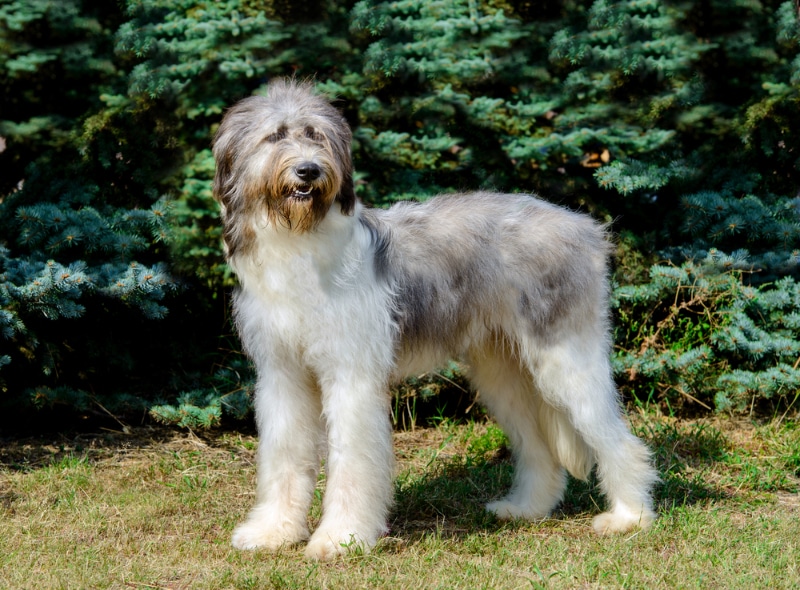Rawhide Alternatives for Dogs: 10 Healthy & Safe Options
Updated on

Rawhide was once exceptionally popular for dogs. However, there are several drawbacks to giving your dog rawhide, one being digestive problems. Therefore, many dog owners are now avoiding rawhide and choosing more natural products.
Luckily, there are many rawhide alternatives out there. More companies are starting to create these products because so many dog owners are now more interested in more “natural” options. Therefore, you can now find several options at your local pet store.
There are many alternatives that you may be able to find in your fridge, too. Many human foods (like carrots) also make good alternative dog chews.
Keep reading for even more alternatives (and which is best for your dog).
The 10 Rawhide Alternatives for Dogs
1. Cheese Chews
Cheese chews are a type of dog treat made exclusively from milk. The milk is processed in a way that’s similar to making cheese. However, the cheese is much harder and longer lasting. Originally, these chews were designed for people traveling long distances (like mountain climbers). However, the dog industry recently took hold of them.
These chews are a high-protein alternative to rawhide. They aren’t made with any chemicals or preservatives. Plus, they’re often much easier for dogs to digest. You can also find some lactose-free varieties. Because they are hard, they are suitable for cleaning your dog’s teeth and preventing plaque buildup. They can also help keep your dog’s breath fresh and reduce bad odors. Depending on how often your dog chews, many of these treats can last several months.
These chews are considered sustainable—they’re biodegradable and completely natural, making them better for the environment.

2. Bully Sticks
Bully sticks are a fairly common dog chew that you can find at nearly any pet store. They’re made from the penis of a bull or steer, but most of the time, they’re marketed as bully sticks (for obvious reasons). They’re a long-lasting chew in most cases, which makes them a perfect alternative to rawhide.
These chews are often high in protein and made without chemicals. They’re easy to digest and work well for any dog that isn’t allergic to beef. Bully sticks are very hard, making them great for cleaning your dog’s teeth. They can prevent plaque and tartar buildup when your dog chews them regularly. Because they’re so popular, you can find various sizes and types available.
They tend to be a bit less long-lasting than other treats—they may only last several hours if your canine is a tough chewer.
3. Tendons
While not as popular as bully sticks, you may also find dog tendons at your local pet store. These chews are made from the tissues that connect muscles to bone. They’re usually air-dried and dehydrated, which makes them tough.
Tendons are a natural, safe alternative to rawhide. They’re usually made without any chemicals. You can also find them made from many different animals, so they can better accommodate your dog’s dietary needs. They’re very good for your canine, too. For instance, they contain glucosamine, chondroitin, and collagen—all of which promote joint health and mobility. They may be particularly good for seniors for this reason.
These chews are often not as tough as others, so they may not be great for tough chewers. You’ll also need to choose the right size for your dog’s weight and chewing strength. These chews may not clean your dog’s teeth as well as others.

4. Tripe Sticks
These chews are made from the lining of a cow’s stomach (or other animals). They’re usually dehydrated, which gives them a unique honeycomb texture and a strong smell. They are high in protein and often made without chemicals, which makes them easier to digest. They’re very good for dogs with sensitive stomachs, as they contain natural enzymes that may help digestion.
The natural honeycomb shape also helps clean your dog’s teeth well. The tiny grooves help scrape the sides of their teeth, helping remove plaque and tartar.
Tripe sticks are particularly good for seniors. Older dogs may have difficulty with digestion and often need help keeping their teeth clean. Many tripe sticks also contain glucosamine and chondroitin, which can help improve mobility for elderly dogs.
Unlike bully sticks or cheese chews, these chews don’t last very long. Depending on your dog’s chewing strength, they may only last several minutes for some dogs.
5. Beef Cheek Chews
As the name suggests, beef cheek chews are made from the skin of a cow’s cheek. They are air-dried or dehydrated and tend to have a fairly soft texture. Therefore, they work best for gentle chewers who don’t usually do much damage. They’re great for seniors and dogs with teeth problems, too. You’ll also find these chews sold as “beef cheek rolls” or “beef cheek slices.”
Because they’re completely natural, these chews are often considered a healthier alternative to rawhide. They’re often made without chemicals or preservatives, making them easier to digest for many dogs.
You can find these in several different shapes and sizes, allowing you to choose the perfect size for your canine. Depending on how roughly your dog chews, they can last for several minutes to hours.

6. Frozen Marrow Bones
Frozen marrow bones are made from bones that still have the marrow inside. They’re usually available at local pet food stores and can be given to dogs frozen. They’re often more expensive than other chews, although they may also last longer.
These bones are high in protein and often withstand heavy chewing. They can also help clean your dog’s teeth well. Because they’re often made without chemicals or preservatives, they’re relatively easy to digest.
These chews tend to be widely available, and you can find at least a few types at your local store. If you choose the right bone for your dog, it can last several hours or even days.
Plus, they’re environmentally friendly and biodegradable.
7. Ears
Ear dog chews are made from different animal ears, such as pigs, cows, and deer. They are usually cleaned and dried, which leaves them with a crunchy, chewy texture. These ears are often sold under the name of whatever animal they come from, such as “pork ears,” “cow ears,” and “deer ears.”
As you might expect, these chews are high in protein and relatively low in fat. They also don’t contain preservatives and are pretty easy to digest. These ears are softer, so they’re a good option for smaller breeds and dogs with dental issues. Despite being very soft, these ears are surprisingly good at cleaning your dog’s teeth. Choose an option that matches your dog’s size and chewing strength, allowing them to last longer.
These chews are environmentally friendly and biodegradable. They’re often by-products of the meat industry where the ears were likely going to get thrown out, anyway.

8. Sweet Potato Chews
Sweet potato chews are made from pieces of sweet potatoes. They’re either dehydrated or baked, usually. You can make them at your home or purchase them from a commercial source. They’re often called sweet potato jerky or sweet potato chips.
These chews are high in fiber and low in fat. They’re often very good for a dog’s digestion, making them perfect for more sensitive canines. They’re high in vitamin A and antioxidants, as well, so they can help support your dog’s immune system, skin, coat, and eye health. They’re very good for dogs with obesity and diabetes, as they can help regulate blood sugar.
These chews don’t last very long. They’re a bit more like chips than chews, however, they’re a good option for sensitive dogs.
9. Raw Carrots
Raw carrots can be a good chew option for dogs that like them, and they can be very healthy for these canines. Their crunchy and sweet texture makes them a great option for dogs that like to chew.
They’re high in fiber and low in calories, making them a good option for obese dogs. They have no preservatives, usually, as the drying process helps them stay fresh. Carrots are also high in vitamin A and beta-carotene. These help support your dog’s immune system, coat, and eye health.

10. Coconut Husks
Coconut husks are quite safe for dogs and are hard and fibrous. The coconut husk is the outside of the coconut. Usually, it is peeled and then cut into pieces, making a sort of rope. They’re often sold as “coconut rope” or “cocochew.”
These husks are extremely low in calories and high in fiber. They don’t contain preservatives and are minimally processed, allowing them to be chewed by even very sensitive dogs. Because they’re very fibrous, they’re also very good at cleaning a dog’s teeth.
They’re great for light chewers or very sensitive dogs. However, they can be a bit much for canines that chew a lot, as they aren’t the toughest material.
With that said, there are some indications that coconut husks may not be completely safe, as they can lead to blockages. They are almost exclusively fiber, so this makes sense. However, it would require lots of coconut husk for this to occur.
What are the Safest Dog Chews?
Just because something is sold for dogs doesn’t necessarily mean that all chews are safe. Heavy chewers are particularly prone to problems with dog chews, as they may consume chews way faster than intended. Cheese chews are very safe for dogs and often fairly hard. They can be utilized for heavy chewers, too.
Bully sticks, as are chews made from veggies (like sweet potatoes and carrots), are also very safe.
The most important part of choosing a safe chew is to select an option that matches your dog’s size and chew level. For instance, a very small bully stick won’t be ideal for a heavy-chewing Pitbull. However, a very large bully stick designed for larger dogs would be.

Which Alternative to Choose?
There are several things you should consider when choosing which alternative to get. Consider your dog’s dietary needs—some chews are only made from a particular type of animal and if your dog is allergic to that protein source, you’ll need to choose a different chew.
Other chews may be hard to find in your area. Cheese chews are newer on the market and may only be found online. However, some larger pet stores now carry them, too. Always choose the correctly sized chew for your dog. If they don’t make a chew in the correct size, you may need to select a different option. As stated, the correct size chew is extremely important for safety reasons.
Select more straightforward chews when possible. For instance, dried sweet potatoes will often be easier on a dog’s stomach than chews with a long list of ingredients. Natural options without chemicals are particularly important for sensitive dogs.
Also, consider your dog’s chewing style. If your dog chews a lot, you need a tougher chew that can withstand their chewing style. If they don’t chew as hard, you can select something softer.
Always supervise your dog with a new chew. While most chews are designed to be safe, you never know how your dog may react to them.
Final Thoughts
Rawhides can cause digestive problems for some dogs. Luckily, there are many other chew alternatives you can consider. For instance, cheese chews are one of the newer inventions on the market that many dogs like. You can also try marrow bones or bully sticks designed for heavy chewers.
Remember to always choose the correct size and toughness for your canine. Larger dogs must be given larger chews, as this prevents them from breaking pieces off (or simply swallowing a chew whole).
You Might Also Be Interested In:
Featured Image Credit: Nel_Botha-NZ, pixabay











